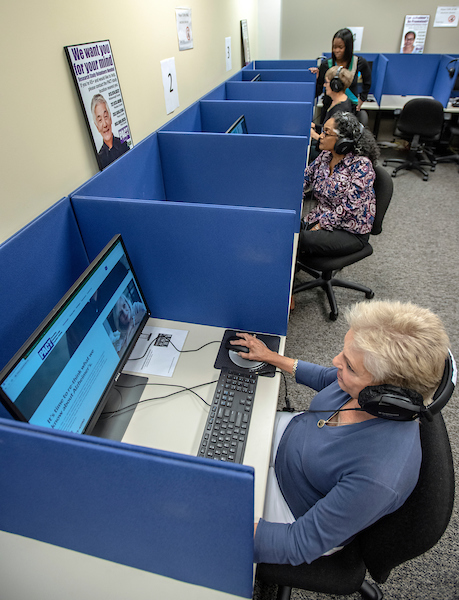The University of South Florida’s Preventing Alzheimer’s with Cognitive Training (PACT) study has added new training sites in Polk and Pasco counties. This first-of-its-kind primary prevention trial, funded by a $2.7 million National Institutes of Health grant, is examining whether a specific type of computerized brain training can reduce the risk of mild cognitive impairment, and dementias like Alzheimer’s disease, in older adults.
USF researchers and community leaders will gather for ribbon-cutting ceremonies at the official openings of the two newest brain training facilities:
- Polk County PACT study site: Thursday, May 9, 11 a.m., at 2225 E. Edgewood Drive, Suite #14, Lakeland, Fla. 33903. Lakeland Mayor Bill Munz will be among the speakers.
- Pasco County PACT study site: Wednesday, May 15, 5:30 p.m., at 14350 7th Street, Dade City, Fla. 33525. Dade City Mayor Camille Hernandez will be one of the speakers.
The clinical trial expansion means that the Tampa Bay area now has four PACT training sites: USF Tampa and USF St. Petersburg, as well as in Lakeland and Dade City. Co-lead investigators of the collaborative PACT study are Jerri Edwards, PhD, a professor of psychiatry and behavioral neurosciences at the USF Health Morsani College of Medicine, and David Morgan, PhD, of the University of Michigan.
Prevention research takes on increased urgency in the wake of recent failures of investigational Alzheimer’s drugs from major pharmaceutical companies to halt brain degeneration.

Research assistant Dorothy St. Pierre, center, chats with a PACT study participant Twyla Sampson in the USF Cognitive Aging Lab.
“Much of what we know about Alzheimer’s disease indicates that early intervention is absolutely critical,” said USF’s Aryn Harrison Bush, PhD, PACT study co-investigator who oversees the Polk County site. “Compelling preliminary evidence has shown that the specific form of adaptive, computer-based cognitive training we are studying decreased the risk of dementia by 29% to 48% compared to older adults who received no training.”
The researchers hope to enroll a total of 1,600 healthy adults age 65 or older, in Tampa Bay and Michigan. Study participants cannot have dementia or other neurological disorders, but a family history of Alzheimer’s does not disqualify a person. They must commit to three initial visits at the training site, and then complete the remaining brain training sessions independently at home.
Lakeland PACT study participant John Peronto, 71, is the primary caregiver for his wife of 41years Sue Peronto, diagnosed with Alzheimer’s disease in 2013. The once vibrant woman, now bedridden, struggles to communicate. But Sue still recognizes and calls her husband by name, and John affectionately refers to his wife as “my Susie Q.”
“I became interested in this study because I’ve seen what this awful disease has done to my wife,” Peronto said. “I’m hoping it expands the knowledge about whether this type of cognitive training can help prevent or slow Alzheimer’s. Right now only a few drugs are on the market, and all they do is provide some short-term relief of symptoms.”
The USF researchers want to broaden the scientific studies to a more diverse population than ever before to evaluate “whether it’s feasible and effective to ‘prescribe’ such brain training exercises at home,” said Jennifer Lister, PhD, PACT study co-investigator who oversees the Pasco County site. “We’re enthusiastic about bringing the opportunity to participate in Alzheimer’s prevention research to our community.”

The researchers hope to recruit a total of 1,600 volunteers — a diverse population of healthy adults age 65 or older — to test whether a specific type of computer brain exercises can reduce the risk of decline in cognitive abilities like thinking, remembering and reasoning.
An estimated 5.8 million Americans live with Alzheimer’s disease. The Alzheimer’s Association projects that number will rise to nearly 14 million by 2050.
For more information about the prevention trial, visit www.pactstudy.org, or call the USF Cognitive Aging Lab at (813) 974-6703.
-Video and photos by Allison Long, USF Health Communications and Marketing
